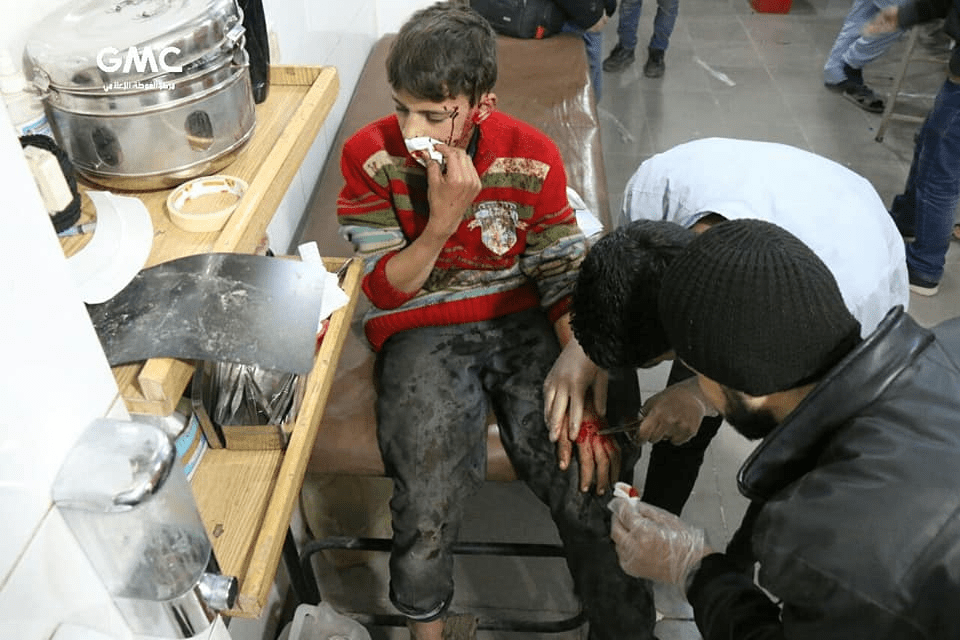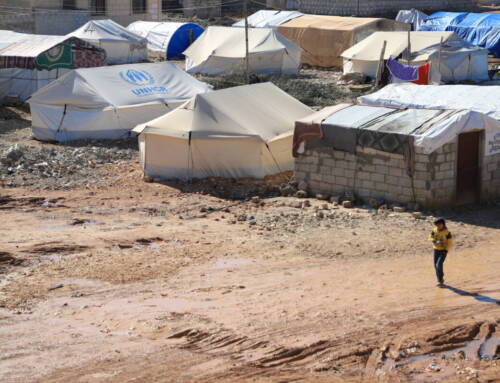East Ghouta ICU doctor: ‘We choose between two lives’
Muhammad al-Marhoum’s intensive care unit in East Ghouta has beds […]
8 March 2018
Muhammad al-Marhoum’s intensive care unit in East Ghouta has beds for 16 patients. He and his fellow doctors are now treating twice that number. Critically injured patients lie on sponge mattresses on the floor. Curtains hung from the ceiling offer minimal privacy.
“There aren’t enough beds to go around,” al-Marhoum tells Syria Direct’s Bahira a-Zarier.
Al-Marhoum has worked as a doctor in an East Ghouta ICU for the past five years—ever since pro-government forces laid siege to the rebel-held suburbs and he could no longer continue his medical studies in Damascus.
Today, scores of patients are overwhelming medical facilities and ICUs like al-Marhoum’s as the Syrian government and its allies wage a devastating air and ground campaign against East Ghouta.
Faced with critical shortages of equipment and medical supplies, al-Marhoum and his colleagues must consider who is most likely to survive before offering treatment.
“We have to decide between giving treatment to a child who can heal and later be released, or an old man who has more than one illness already,” says al-Marhoum.
“Of course, you pick the life of a child,” he says.

Al-Marhoun requested that Syria Direct not publish the exact location of the hospital where he works because he fears it could be targeted by Syrian or Russian warplanes.
As new patients arrive at the ICU, al-Marhoum sometimes discharges patients who still need medical observation to make way for the more critically wounded.
“That’s the bitter reality,” says al-Marhoum. “We choose between two lives.”
Q: How many rooms are available in the Intensive Care Unit (ICU) of the hospital?
Most of the ICUs in East Ghouta are halls with beds and curtains dividing them, not actual rooms. Many of these places weren’t meant to be hospitals in the first place, but most hospitals are out of service. Medical personnel can’t properly prepare these spaces for use as an ICU. For example, we don’t have the cleaning supplies needed to sterilize them.
During the latest government offensive, we have suffered a lot due to a number of hospitals being bombed, as well as the large number of injured people.
In a fully equipped ICU, like the one I work in, we have 16 beds. Currently, our ICU has 37 admitted patients. We have to put some patients on the ground, since there aren’t enough beds to go around. Patients lie on sponge mattresses on the floor between the beds—this is the reality I’m talking about.
We have basic equipment, and a limited number of respirators. Doctors around East Ghouta contact us every day asking if a breathing machine is available for their patients.
Q: If your ICU doesn’t have enough space for all the injured, how does this affect triage operations?
Priority goes to the patients whose condition we can guarantee, God willing, will improve. If a patient will benefit from what we give him—a respirator, blood transfusion or another medical supply—then he is given priority over a patient who is in poor condition.

We take in a large number of patients every day, so we try to immediately release patients whose conditions are improving and send them to a clinic. We try to leave ICU beds open for those who are in worse condition.
Patients are being discharged and sent home even though they still require medical observation for their wounds. There is no place for them. If we were under less pressure, those patients would be admitted to the hospital for treatment, not sent home.
Q: Can you describe what it’s like to make such difficult decisions as a doctor?
We are picking one person’s soul over another. It’s an extremely difficult thing, and challenging from both a religious and humanitarian perspective. You’re saying this person lives and that person dies.
We have to decide between giving treatment to a child who can heal and later be released, or an old man who has more than one illness already. Of course, you pick the life of the child.
[Recently], we had one patient who needed a respirator, but later another person came in who needed it for a short period of time before he’d get better. You have to choose the person who is sure to survive and give him the breathing machine.We choose between two lives. We have no other option. I can’t put two people on one respirator.
When the situation was calmer than it is now, we used to stay with a patient until the final moments of his life, giving him our full time and attention. We didn’t have to choose between him and someone else. We can’t do that now.
Before, we would review a patient’s condition with their family. Now, we tell people immediately that we can’t do anything. This is the bitter reality.
Q: Working as a doctor, are there medical cases that have made you feel powerless?
The cases that strike me the most are the little children who have seen nothing in their lives but siege, hunger, bombs and dirty basements. Destruction, wherever they go. They don’t know there is a world outside. They don’t know that there is something called a park, an ocean, playing with friends. They’ve never seen anything.
Sometimes, we see our relatives in the hospital, injured or martyred. Children are born and die under siege.
Three months ago, there was an eight-year-old child who came in with injuries to his forearm and stomach. His forearm was amputated. When he woke up from the anesthesia, he asked me for water and looked at his amputated arm. Then he asked me, innocently, where it was.
This is devastating for us, especially when we see the reaction of the world, its silence. What did this child do to deserve this? Is he guilty because he lived in a war? He doesn’t know what war means.
Each story like this leaves a scar. We stood helpless before this child.







